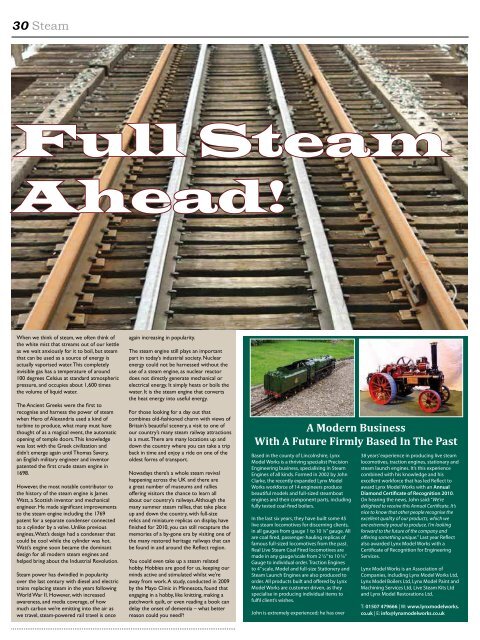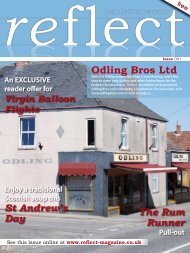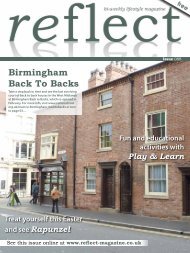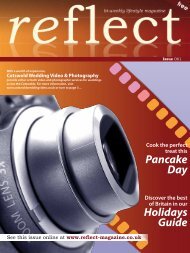You also want an ePaper? Increase the reach of your titles
YUMPU automatically turns print PDFs into web optimized ePapers that Google loves.
<strong>Reflect</strong> <strong>Magazine</strong>: sponsored by<br />
Lubcloud Dairy 01509 505055<br />
30 Steam<br />
Dave Page Engineering 31<br />
Steaming<br />
Full Steam<br />
Ahead!<br />
Ahead:<br />
David Page<br />
Engineering<br />
When we think of steam, we often think of<br />
the white mist that streams out of our kettle<br />
as we wait anxiously for it to boil, but steam<br />
that can be used as a source of energy is<br />
actually vaporised water. This completely<br />
invisible gas has a temperature of around<br />
100 degrees Celsius at standard atmospheric<br />
pressure, and occupies about 1,600 times<br />
the volume of liquid water.<br />
The Ancient Greeks were the first to<br />
recognise and harness the power of steam<br />
when Hero of Alexandria used a kind of<br />
turbine to produce, what many must have<br />
thought of as a magical event, the automatic<br />
opening of temple doors. This knowledge<br />
was lost with the Greek civilization and<br />
didn’t emerge again until Thomas Savery,<br />
an English military engineer and inventor<br />
patented the first crude steam engine in<br />
1698.<br />
However, the most notable contributor to<br />
the history of the steam engine is James<br />
Watt, a Scottish inventor and mechanical<br />
engineer. He made significant improvements<br />
to the steam engine including the 1769<br />
patent for a separate condenser connected<br />
to a cylinder by a valve. Unlike previous<br />
engines, Watt’s design had a condenser that<br />
could be cool while the cylinder was hot.<br />
Watt’s engine soon became the dominant<br />
design for all modern steam engines and<br />
helped bring about the Industrial Revolution.<br />
Steam power has dwindled in popularity<br />
over the last century with diesel and electric<br />
trains replacing steam in the years following<br />
World War II. However, with increased<br />
awareness, and media coverage, of how<br />
much carbon we’re emitting into the air as<br />
we travel, steam-powered rail travel is once<br />
again increasing in popularity.<br />
The steam engine still plays an important<br />
part in today’s industrial society. Nuclear<br />
energy could not be harnessed without the<br />
use of a steam engine, as nuclear reactor<br />
does not directly generate mechanical or<br />
electrical energy. It simply heats or boils the<br />
water. It is the steam engine that converts<br />
the heat energy into useful energy.<br />
For those looking for a day out that<br />
combines old-fashioned charm with views of<br />
Britain’s beautiful scenery, a visit to one of<br />
our country’s many steam railway attractions<br />
is a must. There are many locations up and<br />
down the country where you can take a trip<br />
back in time and enjoy a ride on one of the<br />
oldest forms of transport.<br />
Nowadays there’s a whole steam revival<br />
happening across the <strong>UK</strong> and there are<br />
a great number of museums and rallies<br />
offering visitors the chance to learn all<br />
about our country’s railways. Although the<br />
many summer steam rallies, that take place<br />
up and down the country, with full-size<br />
relics and miniature replicas on display, have<br />
finished for 2010, you can still recapture the<br />
memories of a by-gone era by visiting one of<br />
the many restored heritage railways that can<br />
be found in and around the <strong>Reflect</strong> region.<br />
You could even take up a steam related<br />
hobby. Hobbies are good for us, keeping our<br />
minds active and stimulated whilst we’re<br />
away from work. A study, conducted in 2009<br />
by the Mayo Clinic in Minnesota, found that<br />
engaging in a hobby, like knitting, making a<br />
patchwork quilt, or even reading a book can<br />
delay the onset of dementia – what better<br />
reason could you need?!<br />
A Modern Business<br />
With A Future Firmly Based In The Past<br />
Based in the county of Lincolnshire, Lynx<br />
Model Works is a thriving specialist Precision<br />
Engineering business, specialising in Steam<br />
Engines of all kinds. Formed in 2002 by John<br />
Clarke, the recently expanded Lynx Model<br />
Works workforce of 14 engineers produce<br />
beautiful models and full-sized steamboat<br />
engines and their component parts, including<br />
fully tested coal-fired boilers.<br />
In the last six years, they have built some 45<br />
live steam locomotives for discerning clients,<br />
in all gauges from gauge 1 to 10 ¼” gauge. All<br />
are coal fired, passenger-hauling replicas of<br />
famous full-sized locomotives from the past.<br />
Real Live Steam Coal Fired locomotives are<br />
made in any gauge/scale from 2 ½” to 10 ¼”<br />
Gauge to individual order. Traction Engines<br />
to 4” scale, Model and full-size Stationery and<br />
Steam Launch Engines are also produced to<br />
order. All products built and offered by Lynx<br />
Model Works are customer driven, as they<br />
specialise in producing individual items to<br />
fulfil client’s wishes.<br />
John is extremely experienced; he has over<br />
38 years’ experience in producing live steam<br />
locomotives, traction engines, stationary and<br />
steam launch engines. It’s this experience<br />
combined with his knowledge and his<br />
excellent workforce that has led <strong>Reflect</strong> to<br />
award Lynx Model Works with an Annual<br />
Diamond Certificate of Recognition 2010.<br />
On hearing the news, John said: “We’re<br />
delighted to receive this Annual Certificate. It’s<br />
nice to know that other people recognise the<br />
excellent quality of our products, which we<br />
are extremely proud to produce. I’m looking<br />
forward to the future of the company and<br />
offering something unique.” Last year <strong>Reflect</strong><br />
also awarded Lynx Model Works with a<br />
Certificate of Recognition for Engineering<br />
Services.<br />
Lynx Model Works is an Association of<br />
Companies, including Lynx Model Works Ltd,<br />
Lynx Model Boilers Ltd, Lynx Model Paint and<br />
Machining Services Ltd, Live Steam Kits Ltd<br />
and Lynx Model Restorations Ltd.<br />
T: 01507 479666 | W: www.lynxmodelworks.<br />
co.uk | E: info@lynxmodelworks.co.uk<br />
Ever since building his first steam<br />
engine at school, David Page has<br />
held a lifelong passion for engineering<br />
and steam locomotives. So, what<br />
better way to turn his passion into a<br />
business than by establishing Page<br />
Engineering…<br />
Founded over ten years ago, and<br />
with the engineering discipline<br />
that underpins their designs and<br />
production, Page Engineering are THE<br />
specialists in Burrell Road Locomotives.<br />
They consider that the Burrell Road<br />
Locomotive, along with the Burrell<br />
Scenic Showman’s Engine, represents<br />
the peak of design and function in the<br />
field of traction engines.<br />
Page Engineering is bucking the<br />
current market trends – in March 2009,<br />
they moved into a new workshop.<br />
David told us why he’s decided to<br />
move from the place he’s spent the<br />
last 10 years: “Firstly, my workshop<br />
space was split over two sites, meaning<br />
production wasn’t as efficient as it<br />
could be. Secondly, the workshop<br />
space had become increasingly<br />
cramped over the last few months we<br />
were there – I came to the conclusion<br />
that we’d outgrown the Newcastle<br />
Emlyn site so it was time to move. I<br />
found a brand new factory unit at<br />
Llandysul Enterprise Park in Ceredigion<br />
that was perfect. It was a big operation<br />
to move everything but we settled in<br />
quite quickly.”<br />
Only buying in the casting, every other<br />
aspect of the engine is built by David:<br />
“We build every single piece and even<br />
manufacture the gears. In addition<br />
to the individual parts, we can supply<br />
fully assembled and finished units, like<br />
wheels and boilers.”<br />
Offering individually handcrafted, half<br />
size versions of these classic engines<br />
(this is six-inch scale), Page Engineering<br />
build to the highest standards and their<br />
services are available across the <strong>UK</strong>.<br />
David not only specialises in steam<br />
engines, but he also applies his skills to<br />
the restoration of steam engines, as<br />
well as developing a complete single<br />
cylinder version of the engine, which is<br />
cheaper and less work. A full range of<br />
six-inch castings is available and they<br />
also offer:<br />
• A fully certified boiler<br />
construction service<br />
• A full wheel building and<br />
assembly service<br />
• Full gear cutting service<br />
• A high quality machining<br />
facility to fabricate your personal<br />
requirements<br />
Due to the rapidly changing cost of<br />
some of the materials used, prices<br />
do vary. However, Page Engineering<br />
guarantee the best service, with the<br />
quality reflected in the price.<br />
David adds: “Customer care is<br />
important to us, and we strive to offer<br />
a flexible and supportive service at<br />
all times. I enjoy doing what I do and<br />
approach every new job with the same<br />
enthusiasm I had twenty years ago!”<br />
As part of a new development, David<br />
recently embarked on a project to<br />
develop a complete single cylinder<br />
version engine. Inspired by the<br />
construction of an agricultural engine<br />
back in 1899, David explained more: “I<br />
usually work on two cylinder engines,<br />
however I thought it would be quite<br />
a good idea to construct a single<br />
cylinder version. I recently attended<br />
the Great Dorset Steam Fair, and after<br />
mentioning my plans to a few people,<br />
I have had enormous interest and<br />
several orders, even though they are<br />
still in development! I really enjoy doing<br />
what I do and I see this as a completely<br />
new and exciting challenge!”<br />
<strong>Reflect</strong> recently awarded Dave<br />
with an Annual Bronze Certificate of<br />
Recognition as a reward for all his hard<br />
work over the years.<br />
For more information, contact Page<br />
Engineering<br />
Tel: 01559 364 807<br />
Mobile: 07791 479633<br />
Email: info@davidpageengineering.co.uk
















